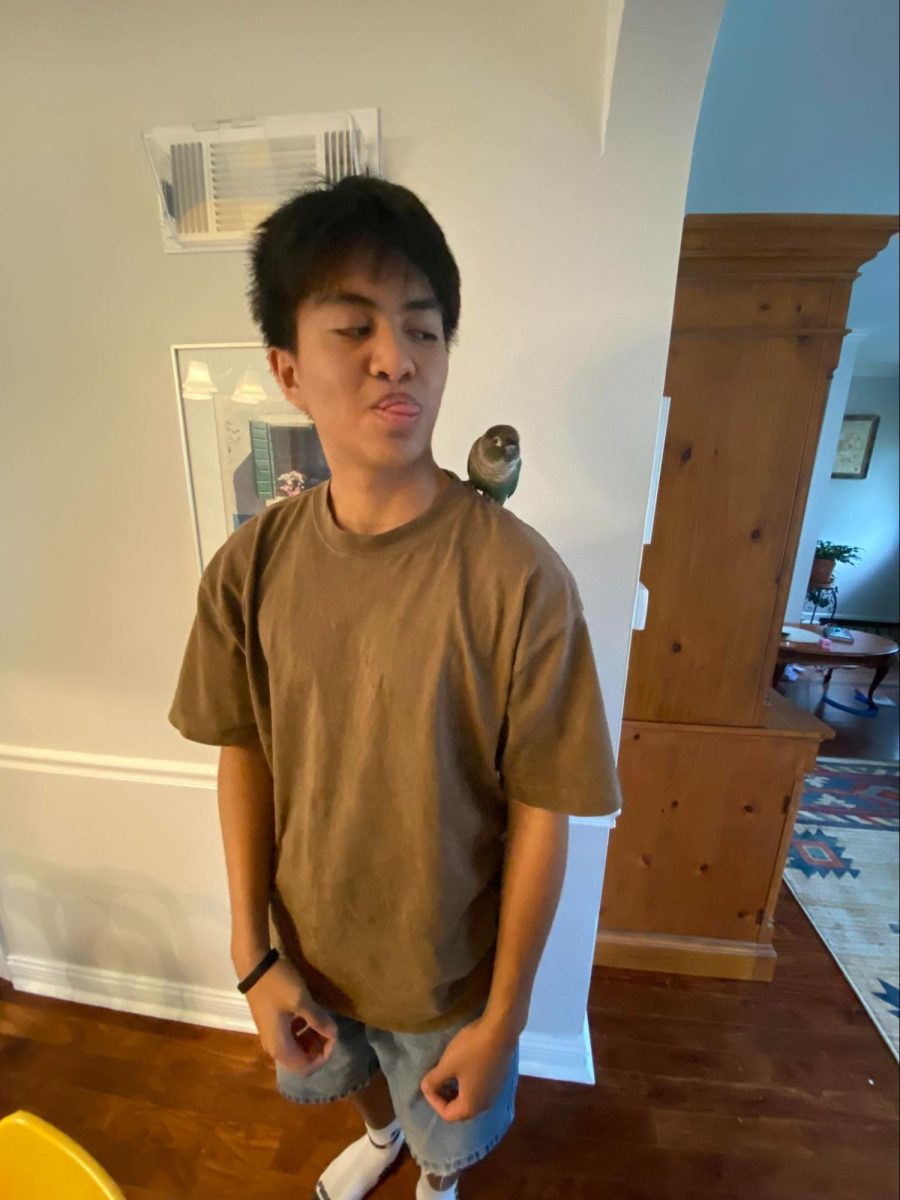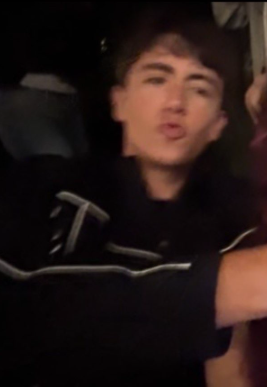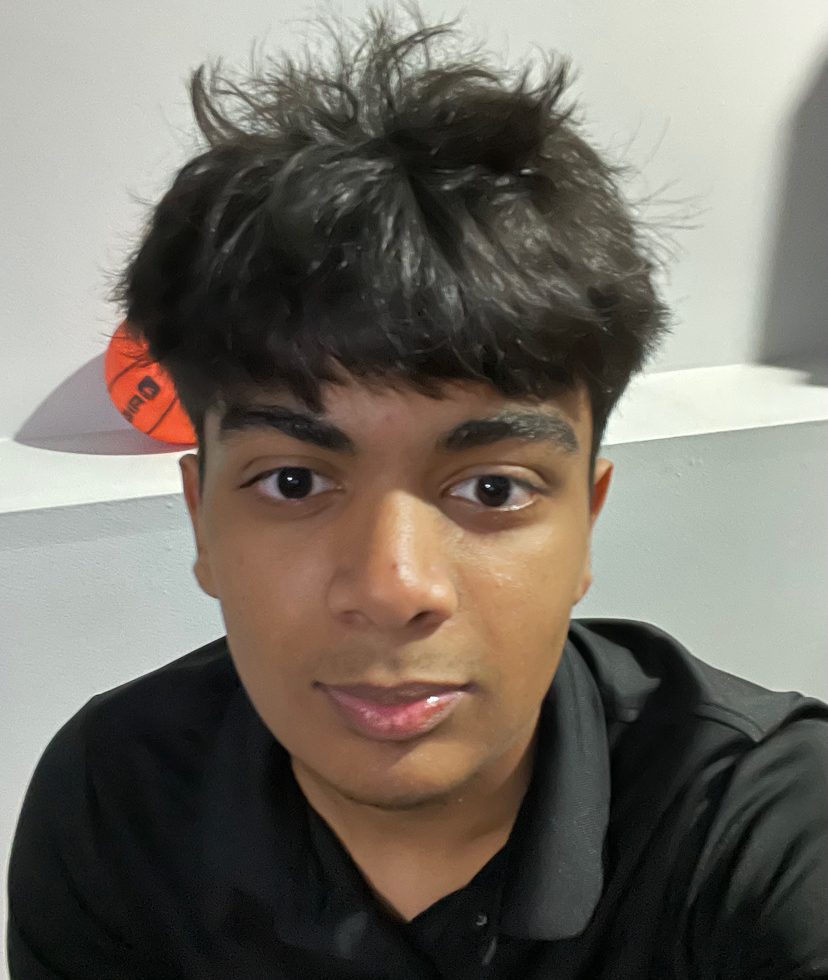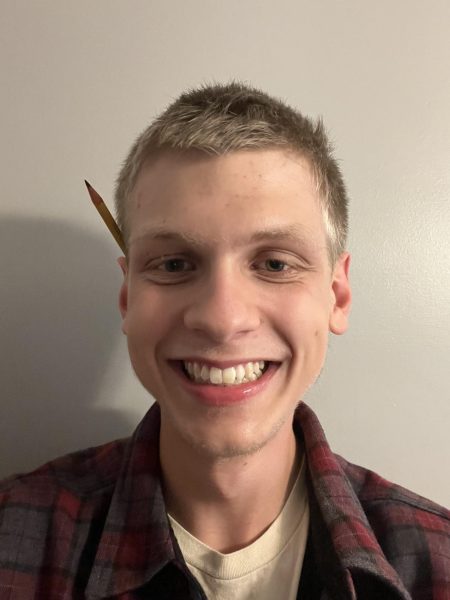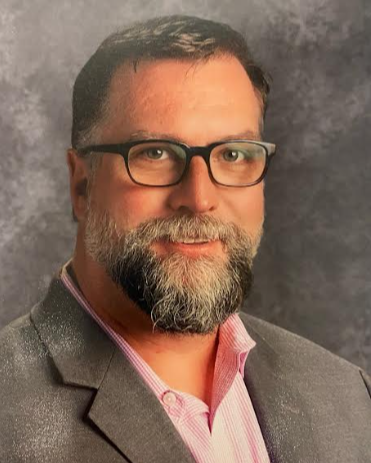
What is your name, your department, and your pronouns? My name is Mr. Peterson, Nils Peterson, I’m in the English Department, and I use he/him pronouns.
What made you want to teach English? Well, I think there’s two parts to that question. There’s one, which is, what made me want to teach, and then also, why English. I think I personally got into English because I liked writing first, and then, like a lot of people do, once I liked writing, I started to develop an appreciation for people who wrote well.
For teaching, that was a little bit of a longer path. I think I resisted it for a while, if I’m being honest. I come from a family with a lot of teachers in it, and I think something in me didn’t want to just say, “Well, I’ll be a teacher too; ” like, I wanted to kind of find my own path. But throughout my life, I had a bunch of teaching experiences. I taught summer school. I taught kids how to swim, and I always liked it, but I kept sort of pushing back against it.
And so then, as a young adult, after college, I had a job down in The Loop in Chicago, it was like a real job–I had benefits, I went to a company and all that sort of thing. And I got to a point where I realized I didn’t really want a future at that company–I could see what people were doing there and I just couldn’t imagine myself in 30 years having lived that life. And then I went back to graduate school, to get a teaching certificate, because I decided it was time to admit what I should be doing: teaching.
Has a book ever changed your life? Do you remember any particular book that had that effect? Well, sure. In middle school, I just started to love escapist literature, like Stephen King horror novels, or just things like that, probably because I wasn’t feeling that great about where I was in the world. But then also, a book that a lot of kids read here at school, The Things They Carried–I have certainly never served our country, I’ve never been in war, but in some measure, the genius of that book is to help me understand the emotions that that author, Tim O’Brien, went through. What he struggled with when he was a soldier in the Vietnam War. So I’m not arrogant enough to think that I know what it means to have been through it, but it’s helping me broaden my perspective and maybe gain some empathy for it.
What do you enjoy outside of school? Well, of course, I have a family, so that’s my biggest time commitment, and I love hanging out with my kids and seeing what they’re doing. And outside of that, I’d say my biggest hobby is probably music. Listening to music, and [although] I’m a terrible musician…playing music when I can, even though I have no skill for it.
What instrument(s) do you play? Mostly bass guitar, [acoustic and electric] guitar. I screw around with stuff like that. I have a very cheap mandolin in my basement, I have a cheap little ukulele–like, any kind of stringed instrument like that. I think of myself as somebody who likes to go to a museum and can appreciate a beautiful piece of art. And I can’t necessarily create that art, but I really enjoy it. It’s the same way with music: I can’t do it, but I really love it.
When and how did you start teaching Creative Writing? It’s always been sort of something I care about. But that is largely a function of scheduling, honestly. I taught it early in my career, long, long ago. Because at that time, I was the newspaper advisor, and I taught journalism, and that always left a little blank hole for half a year of my schedule. They would always give me one of the English electives to fill it in, and Creative Writing was it, so I taught it for a while then. At one point, the English department needed somebody to do Creative Writing and I said I would like to do it and it fit into my schedule, so I got to do it.
What is one song your students probably don’t know, that you wish they did? Well, I like music, so there’s gonna be a lot of songs. There’s a recent artist named Jason Isbell, who I think writes a lot of amazing lyrics. I don’t know that his general music is something that a lot of students will always like, but I think some of his lyrics are really powerful. In fact, I use one of the songs in creative writing, because I love it so much…“Dreamsicle” is the song I use.
What is the best concert you’ve ever attended? Everyone can laugh at me for this one, but when I was young, I saw Bon Jovi in concert. They were pretty good. I just mentioned Jason Isbell, he’s great in concert. I went to see, not the first, but one of the first, Lollapaloozas. I’m not going to remember everybody, but I know it included the Beastie Boys, Bob Dylan, George Clinton and the P-Funk All-Stars, the Smashing Pumpkins–the Red Hot Chili Peppers might have played at the show I was in.
What is something people should know about you right off the bat? As a teacher, as a friend, as just another person? Well, I’m guessing a lot of people will read this. As a teacher, I hope that they will feel that I am compassionate, and I care about them. But part of that caring is also that I want to challenge them. And I always want to be fair and compassionate, and to hear their side of things. As a friend, I hope I’m a good and loyal/friend. Somebody people can count on. That’s what I strive to be.
What’s it like for you, being an English teacher at a time when many schools face controversy over what books students should read? I think it is very important to understand that each of us has a perspective and life experiences that are different from other people’s. We should be careful not to make any sort of assumptions that the way something affects one person is the same way it would affect somebody else. And so I think in some ways, that heightened sensitivity to how people will react is important and a very good thing. The challenge, of course, for a lot of teachers, is we want to be able to think about mature and important topics, and sometimes that includes unpleasant material. And so there’s this very difficult balance between getting students to understand life in all of its ugliness and beauty, and not going so far that you’re presenting them with something hurtful. That line is not in the same place for everybody, so that’s a very difficult thing to gauge.
How much do you worry about students using software like ChatGPT on their writing? Are you more or less worried about this than about kids copying writing assignments from a website or another student? I’m very worried about it. When somebody goes on whatever the AI is, and they say “write an essay for me on Romeo and Juliet,” there is no engagement by them at all. They’re learning zero from it, and they’re not developing these skills. It stops the growth. Oddly, even though plagiarism is horrible and I don’t want to encourage it, AI might even be slightly worse because sometimes I don’t think students even read it. The student that’s copying another student’s homework is, at least theoretically, reading it, so they have some idea of the copy.
Do you think vocabulary and language games, like Wordle, have had a positive impact on your students? I’m not sure how prevalent those specific word games are among my students. But anything, even if it’s under the guise of a game, that’s introducing people to new words, new vocabulary, isn’t a bad thing.
What accounts for your fear of sharks? At some point at a very young age, I managed to watch the movie “Jaws.” I was little enough that my distinct memory [of watching the film] is that I closed my eyes. And so, I could just hear people screaming during the shark attacks, which was way worse in my little brain than it probably actually is in the movie. I grew up swimming in Lake Michigan, where the whole time, you have no idea what’s down there–Who knows what sort of leviathan is underneath? So, you combine the fact that you’re suddenly not at the top of the food chain with something that’s in its element, you don’t see it coming–for a little kid with an imagination, that’s pretty terrifying.


